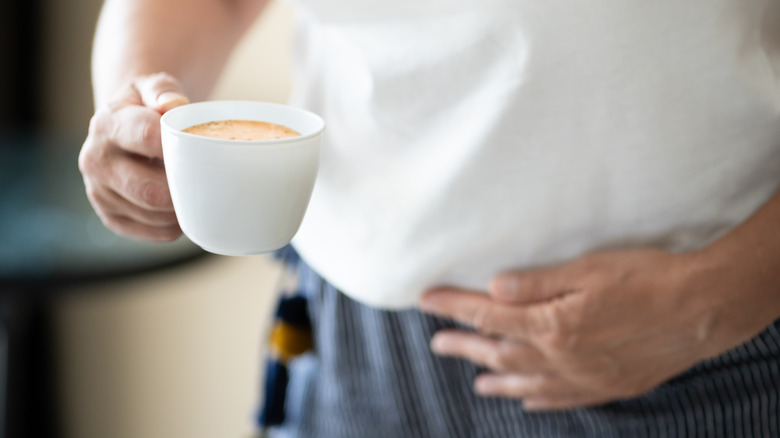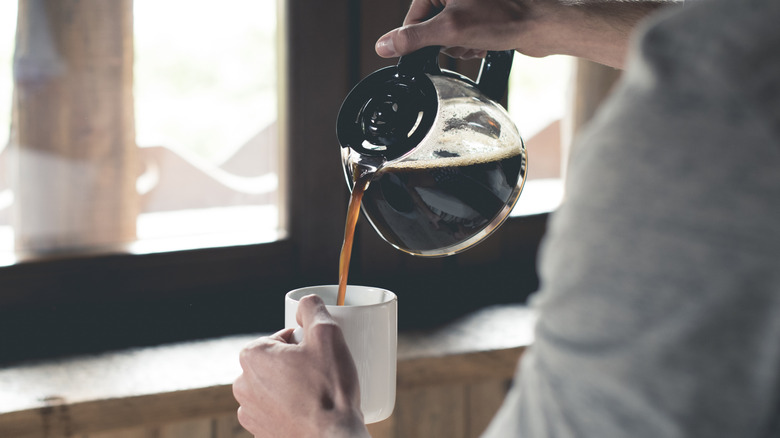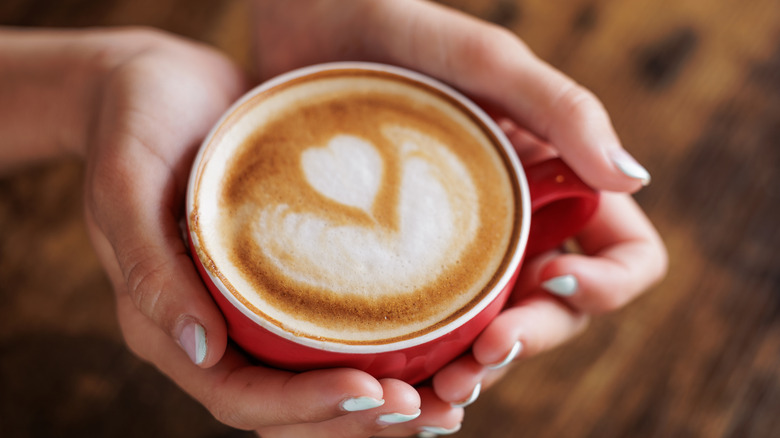The Science Behind Why Coffees Make You Need To Use The Bathroom
We may receive a commission on purchases made from links.
We've all been there. That moment when your morning cup of joe turns into a mad dash for the nearest bathroom as your bowels rumble. It's no secret that coffee makes us need to visit the porcelain throne, but what's the reason behind this effect? To get to the bottom of the issue, Chowhound spoke to Kantha Shelke, Ph.D., food scientist and founder of Corvus Blue LLC, a food science and research firm, and author of "Pasta and Noodles: A Global History".
According to Dr. Shelke, coffee triggers the urge to use the bathroom because of a few key components. The first is caffeine. She says, "Caffeine stimulates and enhances muscle contractions, circulation, and bowel movement." As noted by Healthline, caffeine causes the colon to become roughly 60% more active than water. However, interestingly, the urge to use the bathroom can still arise with decaf. So what about the other elements of coffee?
Coffee also affects our hormones. The drink "boosts hormones like gastrin and cholecystokinin, which activates the gastrocolic reflex, prompting gut contractions that move stool toward the rectum," says Dr. Shelke. Gastrin, a peptide hormone, causes increased gastric motility, which is the movement of muscles and stomach juices that help food travel through the stomach. It also promotes mucosal growth — to do with keeping everything moist, and is involved in the release of stomach acid, which helps everything break down. Cholecystokinin is a hormone that is released in the small intestine during digestion to help break down food. Lastly, specific compounds in coffee also have an impact. Dr. Shelke points to polyphenols, the antioxidants common in plants, that increase activity in the gut.
When you drink it and what you add to coffee have an impact
The fact that you drink coffee in the morning is also a factor. Dr. Shelke says, "Coffee's effect may be stronger in the morning because the stomach is empty and the caffeine uptake is more rapid to quickly affect gastric emptying and colon movements." That said, coffee's exact effect on digestion remains slightly mysterious, even to scientists, and there is still debate over whether it's good or bad for digestion.
And along with pointing out the things in coffee that cause us to head to the bathroom, Dr. Kantha Shelke also states that the ingredients we add to coffee can affect our bowels. Remember Starbucks' Oleato coffee? Yes, the one with the olive oil. Well, many consumers have complained of it having a laxative effect. This is because olive oil is a type of fat that can stimulate the colon, especially when too much is consumed quickly. Added to the effects of coffee, the results can be explosive.
Similarly, you may think adding cream to coffee could help mitigate its impact on your bowels. Unfortunately, it can have the opposite effect, as around 68% of people have trouble digesting lactose. If you're already sensitive to lactose, adding it to coffee can increase the need to head to the bathroom. In fact, many people don't develop intolerance symptoms until they're older, so even if you've been chowing down on dairy your whole life it could become an issue down the line.
You can't stop the effects of coffee but you can work around them
While there is no way to completely remove the effects of coffee, you can either work around them or use them to your advantage. For instance, you could cut back on the amount you consume (blasphemy, we know) to see if there is a sweet spot that doesn't have you running for the bathroom. Likewise, if your coffee-caused bathroom breaks are happening at the worst times, like when you're stuck in traffic heading to work, try drinking your coffee at a different time.
If additives like dairy creamer are causing problems, try a non-dairy alternative, like Starbucks is now offering at no extra cost, to see if that makes a difference. Similarly, if you're using a sweetener containing sucralose, like Splenda, this can also cause digestive troubles, so consider trying something like monk fruit sweetener or Stevia. However, many sweeteners cause digestive issues in some people. It may be best to switch to honey in your hot drink if that's the case for you.
Of course, you can also deliberately use coffee as a way to clear things out, so to speak. It's estimated that about 16% of adults and 33% of adults over 60 struggle with constipation, according to the National Institute of Diabetes and Digestive and Kidney Issues. In that case, coffee could be your best friend. That said, those who are highly sensitive to the effects of coffee, have irritable bowel syndrome, or are managing high blood pressure should be careful with their coffee intake as it can exacerbate symptoms.


